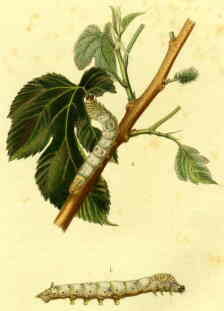"Os
estudos de Pasteur sobre os bichos-da-seda e a gênese da teoria microbiana
das doenças"
["Pasteur's study of silkworms
and the beginning of the germ theory of diseases"]
Renata
Rivera Ferreira & Roberto
de Andrade Martins
Artigo publicado em Perspicillum 9: 113-75, 1996.
 Resumo:
O estudo dos bichos-da-seda teve papel fundamental no desenvolvimento da
teoria microbiana das doenças, na década de 1860. Foi somente
após investigar a “pebrina” dos bichos-da-seda que Pasteur se dedicou
à pesquisa de outras doenças. Contrariamente ao que se costuma
acreditar, no entanto, este artigo procura mostrar que Pasteur foi inicialmente
um opositor da teoria microbiana (ou parasitária) da doença
dos bichos-da-seda. Foi principalmente Pierre Jacques Antoine Béchamp
quem, na mesma época, opôs-se a Pasteur e defendeu a natureza
parasitária da “pebrina”. Após muitos meses combatendo a
etiologia parasitária, Pasteur mudou de opinião, mas nunca
deu o devido crédito a Béchamp. O artigo procura esclarecer
esse episódio e utilizá-lo para discutir algumas questões
historiográficas mais amplas.
Resumo:
O estudo dos bichos-da-seda teve papel fundamental no desenvolvimento da
teoria microbiana das doenças, na década de 1860. Foi somente
após investigar a “pebrina” dos bichos-da-seda que Pasteur se dedicou
à pesquisa de outras doenças. Contrariamente ao que se costuma
acreditar, no entanto, este artigo procura mostrar que Pasteur foi inicialmente
um opositor da teoria microbiana (ou parasitária) da doença
dos bichos-da-seda. Foi principalmente Pierre Jacques Antoine Béchamp
quem, na mesma época, opôs-se a Pasteur e defendeu a natureza
parasitária da “pebrina”. Após muitos meses combatendo a
etiologia parasitária, Pasteur mudou de opinião, mas nunca
deu o devido crédito a Béchamp. O artigo procura esclarecer
esse episódio e utilizá-lo para discutir algumas questões
historiográficas mais amplas.
Você pode obter uma cópia
deste artigo em formato PDF, "clicando" a figura ao lado  --
--
Grupo
de História, Teoria e Ensino de Ciências – UNICAMP
"Os estudos de Pasteur sobre os
bichos-da-seda e a gênese da teoria microbiana das doenças"
["Pasteur's study of silkworms
and the beginning of the germ theory of diseases"]
Paper published in Perspicillum 9: 113-75, 1996.
Abstract: The study of silk-worms, in the 1860’s, was a fundamental
step in the development of the microbe theory of diseases. Only after investigating
the silk-worm pebrine did Pasteur undertake the research of other diseases.
Contrary to common belief, however, this article attempts to show that
initially Pasteur opposed the microbe (or parasite) theory of the silk-worm
disease. Pierre Jacques Antoine Béchamp was the main researcher
who confronted Pasteur’s ideas and defended the parasitary nature of pebrine.
After criticising the microbe aetiology for several months, Pasteur changed
his opinion, but he never gave due credit to Béchamp. The aim of
the article is to elucidate this episode and to use it as a case study
to discuss some broader historiographic problems.
You can download this article in PDF format
by selecting this figure  --
--
Group
of History and Theory of Science – UNICAMP, Brazil
 Resumo:
O estudo dos bichos-da-seda teve papel fundamental no desenvolvimento da
teoria microbiana das doenças, na década de 1860. Foi somente
após investigar a “pebrina” dos bichos-da-seda que Pasteur se dedicou
à pesquisa de outras doenças. Contrariamente ao que se costuma
acreditar, no entanto, este artigo procura mostrar que Pasteur foi inicialmente
um opositor da teoria microbiana (ou parasitária) da doença
dos bichos-da-seda. Foi principalmente Pierre Jacques Antoine Béchamp
quem, na mesma época, opôs-se a Pasteur e defendeu a natureza
parasitária da “pebrina”. Após muitos meses combatendo a
etiologia parasitária, Pasteur mudou de opinião, mas nunca
deu o devido crédito a Béchamp. O artigo procura esclarecer
esse episódio e utilizá-lo para discutir algumas questões
historiográficas mais amplas.
Resumo:
O estudo dos bichos-da-seda teve papel fundamental no desenvolvimento da
teoria microbiana das doenças, na década de 1860. Foi somente
após investigar a “pebrina” dos bichos-da-seda que Pasteur se dedicou
à pesquisa de outras doenças. Contrariamente ao que se costuma
acreditar, no entanto, este artigo procura mostrar que Pasteur foi inicialmente
um opositor da teoria microbiana (ou parasitária) da doença
dos bichos-da-seda. Foi principalmente Pierre Jacques Antoine Béchamp
quem, na mesma época, opôs-se a Pasteur e defendeu a natureza
parasitária da “pebrina”. Após muitos meses combatendo a
etiologia parasitária, Pasteur mudou de opinião, mas nunca
deu o devido crédito a Béchamp. O artigo procura esclarecer
esse episódio e utilizá-lo para discutir algumas questões
historiográficas mais amplas.